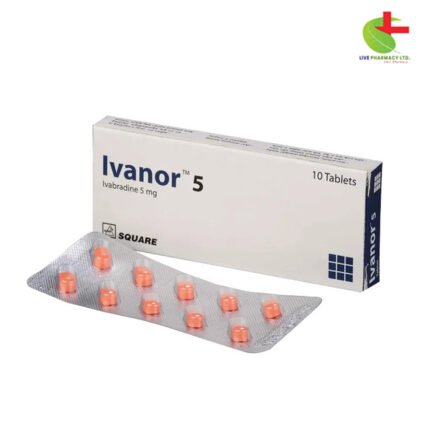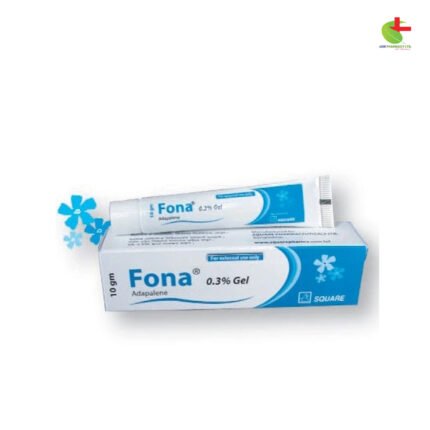Ivanor 7.5
351.10৳ Strip
- Experience Ivanor, a solution for chronic stable angina pectoris in coronary artery disease patients with normal sinus rhythm.
- Contains ivabradine, a selective heart rate-lowering agent.
- Reduces cardiac workload and oxygen consumption.
- Enhances coronary artery perfusion and oxygen supply by extending diastole.
- Provides targeted action and precise dosage for effective symptom management.
 Brand
Brand
|
Square Pharmaceuticals PLC |
|---|---|
 Generics
Generics
|
Ivabradine |
Indications
Ivanor, recommended for the symptomatic treatment of chronic stable angina pectoris in patients with coronary artery disease exhibiting normal sinus rhythm. Ivanor is indicated for:
- Patients intolerant to or with contraindications for beta-blockers.
- Combination use with beta-blockers in patients inadequately controlled with optimal beta-blocker dosage and a heart rate exceeding 60 bpm.
Pharmacology
Ivanor, featuring ivabradine as its active component, functions as a pure heart rate-lowering agent. By selectively inhibiting the cardiac pacemaker I f current in the sinus node, it regulates heart rate and reduces cardiac workload, subsequently lowering oxygen consumption. Moreover, Ivanor extends diastole, enhancing coronary artery perfusion and augmenting oxygen supply to the heart. Its effects are confined to the sinus node, with no impact on cardiac conduction times, contractility, or ventricular repolarization.
Dosage & Administration
For adults, the typical initial dosage of Ivanor is 5 mg twice daily, potentially increased to 7.5 mg twice daily based on therapeutic response after 3-4 weeks. Administration usually involves one tablet in the morning and one in the evening during meals. If resting heart rate persistently falls below 50 bpm or bradycardia-related symptoms emerge, dosage adjustment to 2.5 mg twice daily is necessary. Consider initiating treatment with a lower dosage for elderly patients, especially those aged 75 years or older.
Renal and Hepatic Considerations
No dosage adjustment is needed for patients with renal insufficiency and creatinine clearance above 15 ml/min. In patients with mild hepatic impairment, no dosage adjustment is necessary, but caution is advised for those with moderate impairment. Ivanor is contraindicated in severe hepatic insufficiency cases.
Interactions
Avoid concomitant use of Ivanor with QT wave-prolonging medicinal products, particularly cardiovascular and non-cardiovascular ones, to prevent exacerbating QT prolongation. If necessary, close cardiac monitoring is recommended.
Contraindications
Ivanor usage is contraindicated in individuals with hypersensitivity to ivabradine or any excipients, resting heart rate below 60 bpm, cardiogenic shock, acute myocardial infarction, severe hypotension, severe hepatic insufficiency, sick sinus syndrome, sino-atrial block, heart failure, pacemaker dependency, unstable angina, 3rd-degree AV block, and in combination with strong cytochrome P-450 3A4 inhibitors.
Side Effects
Potential side effects of Ivanor include visual symptoms, blurred vision, bradycardia, 1st-degree AV block, ventricular extrasystoles, headaches, and dizziness.
Pregnancy & Lactation
Ivanor is contraindicated during pregnancy due to limited data on its use in pregnant women. Animal studies suggest excretion in breast milk, thus contraindicating its use during breastfeeding.
Precautions & Warnings
Special precautions should be exercised in patients with mild to moderate hypotension, atrial fibrillation, congenital QT syndrome, or those treated with QT wave-prolonging medicinal products. Caution is advised in cases of moderate hepatic insufficiency and severe renal insufficiency.
Therapeutic Class
Ivanor belongs to the class of Other Anti-anginal & Anti-ischaemic drugs.
Storage Conditions
Store Ivanor below 30°C, away from light and moisture, and out of reach of children.













Reviews
There are no reviews yet.